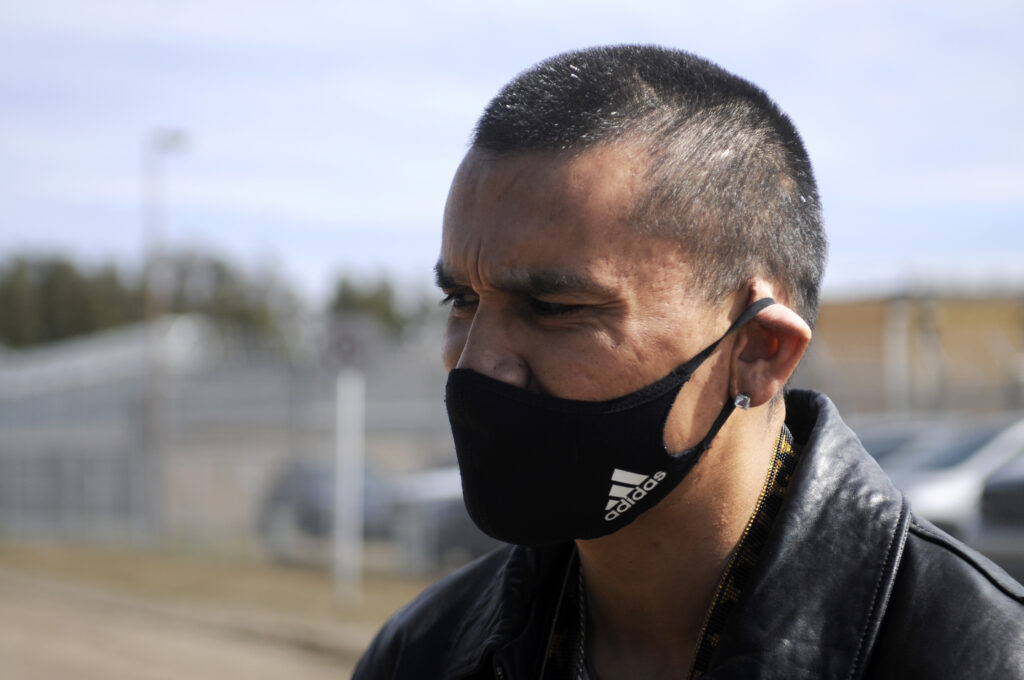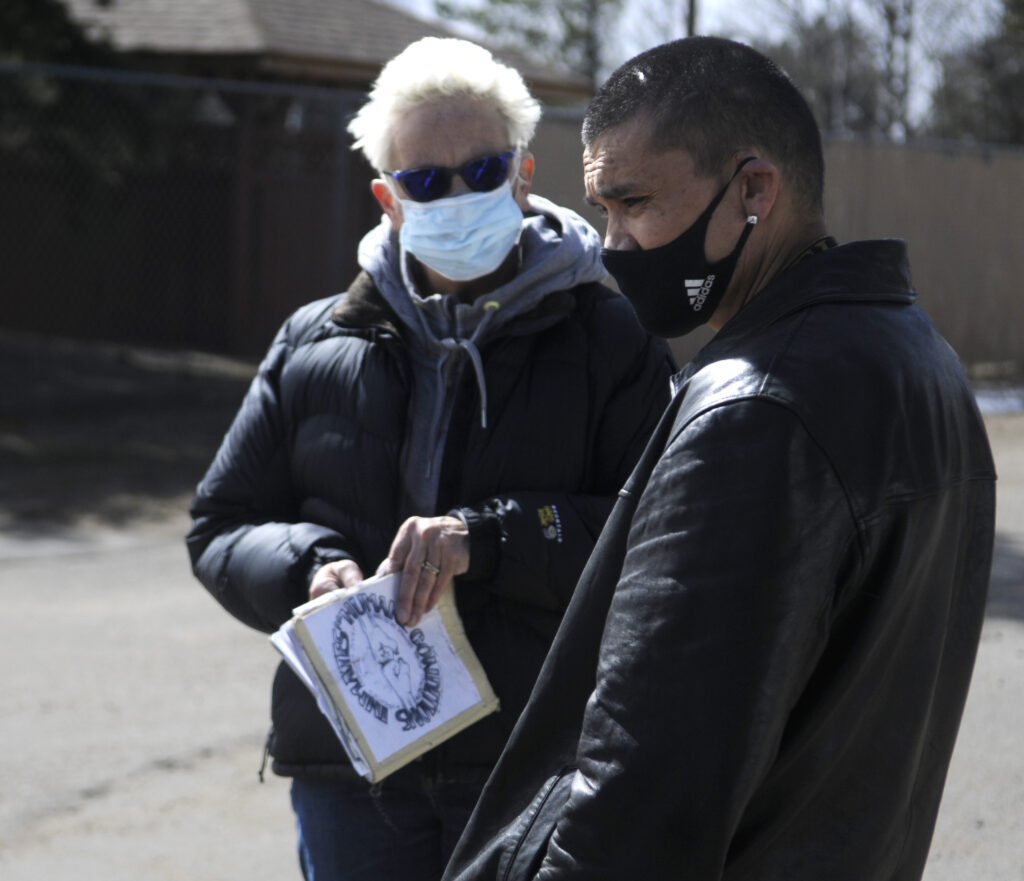
Advocates travelled to Pine Grove Institution in Prince Albert Tuesday to show solidarity with a group of women prisoners on a hunger strike calling for better conditions.
Pine Grove is Saskatchewan’s only women’s prison.
Women at the institution began a hunger strike over a week ago and said they wanted changes to address concerns about reduced access to medical care and inadequate rehabilitative programs.
According to the province, some of the participating inmates have “expressed complaints on a number of issues,” including court delays caused by the pandemic, COVID restrictions within the jail, gang placements and canteen selection.
As of Wednesday, the Ministry of Justice and Policing said, no inmates were refusing their food trays.
Tuesday’s demonstration was organized by Cory Cardinal, who founded the advocacy group Inmates 4 Humane Conditions. It was attended by about a half dozen people, and while the group was small, they were vocal.
Cardinal had been on a hunger strike of his own. He had called for better conditions at Saskatoon Correctional Centre and at Pine Grove. He was released from Saskatoon Correctional last week.
“People in prisons are tired of getting swept under the rug. We’re tired of suffering, of being labelled, being dehumanized,” Cardinal said.
He was joined outside Pine Grove by Sherri Maier of Beyond Prison Walls Canada.
The Elizabeth Fry Society of Saskatchewan has been in discussions with management at the facility since last week. Kayleigh Lafontaine, a reintegration worker with the organization, said it received a 17-page letter written by an inmate, Amanda Twardy, describing several of the issues.
The society has a working relationship with Pine Grove management, and under normal circumstances, when Elizabeth Fry’s staff learn of issues from inmates, they can address them with managers right away — but recently, with their access to the jail limited due to the COVID-19 pandemic, no visitors are allowed and they hadn’t been hearing about problems until Twardy’s letter arrived, Lafontaine said.
Twardy, on remand at Pine Grove since July 2020, was taking part in the hunger strike with other inmates in her unit. In an interview late last week, she said the issues stem from what’s happening on the outside, particularly due to how the justice system is working during the pandemic.
She said programming is being offered in the form of booklets, rather than from someone in person. For example, the grief and loss program consists of PowerPoint slides on paper with questions to fill out on each page. She said others have told her this isn’t benefiting them.
“There’s no credit for it; they’re very basic, do-it-yourself. I mean, if you have a learning disability, you’re screwed, because if you can’t read, you’re screwed,” Twardy said.
The Elizabeth Fry Society, through discussions with Pine Grove management, can now meet with inmates over Skype and had their first meeting on Tuesday. The organization is now looking at providing more one-on-one services that way.
Twardy said medication is now distributed two times a day instead of three, which has meant sleeping medications are distributed as early as 6:30 p.m., and non-emergency visits to the medical unit are limited to once a week.
In a statement, the ministry said inmates have access to health and mental health services, as they did before the pandemic. Medical and psychiatric services virtually when required, and services beyond what is available in a correctional facility can be provided.
Inmates also have access to cultural services such as elders and chaplains.
“While in-person services have been suspended due to the pandemic, inmates are able to contact chaplains and Elders by phone. These phone calls are free, and are considered privileged phone calls,” the ministry wrote.
“Corrections staff have discussions with inmates on a daily basis, during which inmates are able to raise any concerns they may have. Staff endeavor to work with inmates to resolve these concerns to the best of their ability. Staff at Pine Grove Correctional Centre are actively working with the inmates to address their concerns.”
The province said the process for inmate complaints is detailed in the Correctional Services Act, and urged inmates to go through legislated channels if they have any concerns. Additionally, they said, inmates may raise concerns with the ombudsman.
The province didn’t provide a response to a question about whether services are available to all inmates or just those on remand.
According to Maier and Cardinal, inmates also have concerns that their complaints aren’t being taken seriously. They feel like nobody is listening and nobody has their back.
Even if inmates were to try to file a formal complaint, Cardinal said, the process is difficult and requires a higher ability to read, write and argue than many of those incarcerated possess.
“People who are incarcerated are … marginalized,” he said.
“The people employed in these places are from a different level of society. The complaint process that they offer here is very ineffective. It’s faulty. It’s very meticulous. You almost need a formal education … to make it through, for your complaint to make it to the proper authority figure so that it would actually make a difference. I see it over and over. It’s a model of suppression.”

With jails overcrowded, Maier and Cardinal added, services are harder to obtain and some inmates may be forced to live in converted spaces normally used for recreation or rehabilitiation services.
The ministry confirmed Thursday that Pine Grove is housing 192 inmates, of which 76 are serving their sentence and 116 are remanded. In other words, more than half of the inmates housed are still awaiting their legal matters to be resolved and have yet to be convicted of any crime.
The prison is designed for a capacity of 166, meaning it is currently operating at 115.7 per cent capacity.
“Where is the rehabilitation when these buildings are busting at the seams with inmates?” Maier asked.
“With COVID now, that’s uncalled for.”
COVID worsening existing conditions, advocates say
Cardinal added that he has “no faith” in how the province has handled the COVID-19 pandemic. In some instances, dozens if not hundreds of inmates tested positive for the virus. Before it hit in Saskatchewan, he said, it hit Alberta and Manitoba. Corrections officials, he argued, should have taken proactive measures then.
He pointed to the institutions’ high population of Indigenous offenders, who are more likely to have additional health factors such as diabetes, HIV or Hepatitis C.
“Those are some serious, serious vulnerabilities that affect the immune system,” he said.
“If you’re not taking that into consideration, that’s negligence. That’s ignoring the health of a vulnerable demographic — it’s negligence, letting them get sick.”
Critics — including both prisoners’ advocates and correctional officers unions, have criticized the government for not including correctional officers or inmates on their rollout priority list.
“Inmates have to be done too. It can’t be done piecemeal in an institution. You have to do the staff, you have to do the inmates,” Barry Nowoselsky, SGEU spokesperson told CTV News last week. “I’ve had this question raised with me about the inmates before. Well quite frankly, these people were sentenced to two years less a day. They’re not sentenced to death.”
Health Minister Paul Merriman said most correctional officers will become eligible in the coming weeks anyway.
“Right now we have only seen outbreaks declared in two correctional facilities across the province that we have been made aware of so we are monitoring this very close. We are making sure that they are adhering to all of the protocols such as the masking, the cohorting which will help make sure that the spread doesn’t go through that correctional facilities to other offenders. Right now we are focusing any additional vaccines we have on first responders to any scenes as well as any healthcare workers and people that are inside grocery stores that we have identified to have pharmacies when we get to the pharmacies later on in April.”
Some have called for inmates on remand or those reaching the end of their sentences to be released to slow the spread of COVID-19 in prisons. Currently, inmates are quarantined for 14 days when they arrive at an institution, and inmates who test positive are kept in isolation. That hasn’t stopped the virus from spreading through the system, though, with outbreaks at provincial and federal institutions tied to prisoner transfers.
Deb Hopkins, who worked as a legal aid lawyer for over 20 years, also attended Tuesday’s demonstration. She said the systemic issues addressed by the women on hunger strikes are the same ones she’s seen plaguing the correctional system for decades.
“I’ve not worked with these specific women here … but I’ve worked for many years with many people exactly like them, coming from the same life circumstances.”
Hopkins said many of the women in the provincial correctional system, especially those on remand, should not be incarcerated. She said other jurisdictions showed that when people were released during the early stages of the pandemic to slow the spread of COVID-19, the crime rate went down, not up.

“It’s the same statements — just generations of people who have come through this system. I really wish that people in the broader community could get to know these people. There’s an idea that they’re dangerous and they need to be behind bars. If there were actually some interaction between regular people and the people that are here, they will see that it’s not necessary and counterproductive.”
Not only could inmates be managed in the community Hopkins said, but the prison system sets them up to fail. She said many of the women incarcerated at Pine Grove are released from custody homeless, jobless and with their children now in care. They will come out, she emphasized, and shouldn’t be set up to fail.
It’s a statement echoed by Maier and Cardinal.
“There need to be more post-release resources available,” Cardinal said.
“There are so many barriers that inmates face pre-release.”
Maier suggested inmates could apply for social assistance before their release, so that when they are released, they have that cheque and can find housing and not have to resort back to crime.
They pointed to the case of Kimberly Squirrel. Squirrel was found frozen to death after being released from Pine Grove. The incident is under further investigation.
Maier said allowing Squirrel to leave the institution in freezing temperatures without transportation should never have been allowed to happen.
“She’s a human being, my God,” (The government) needs to do something, and act now. The only time we hear from these women is when they commit suicide or they have a death, like Kimberly Squirrel. They need their voices heard now.”
Cardinal hopes his demonstration, and the previous week’s hunger strike, help bring more attention to the women’s plight.
“Even though it’s just here, the fact of the matter is that we’re here and we’re supporting these girls,” he said.
“These girls … should be supported. They should know that somebody has their back. People have their back. People care.”
- With StarPheonix files from Thia James

